Mozart & Mazzoli Premiere
March 11-12, 2022 | Music Hall
Program
MISSY MAZZOLI: Violin Concerto (Procession) [CSO Co-commission]
I. Procession in a Spiral
II. St. Vitus
III. O My Soul
IV. Bone to Bone, Blood to Blood
V. Procession Ascending
WOLFGANG AMADEUS MOZART: Mass in C Minor, Great Mass
Program Notes
-
Violin Concerto (Procession)
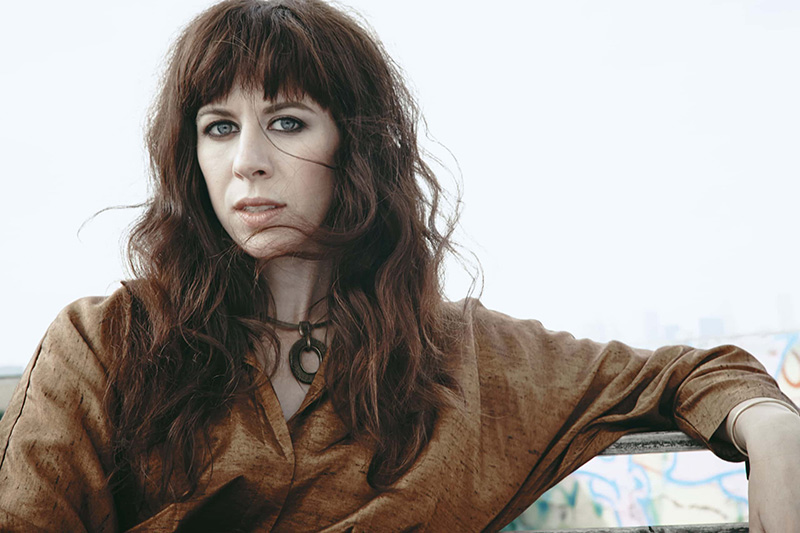
Credit: Marylene May- Born: October 27, 1980, Lansdale, Pennsylvania
- Work Composed: 2021
- Premiere: The Concerto was first performed in February 2022 by the National Symphony Orchestra, which co-commissioned the work with the CSO. Jennifer Koh, for whom the piece was written, was soloist.
- Instrumentation: 2 flutes (incl. piccolo), 2 oboes, 2 clarinets (incl. bass clarinet), 2 bassoons (incl. contrabassoon), 4 horns, 2 trumpets, 2 trombones, tuba, bass drum, brake drum, glockenspiel, snare drum, suspended cymbals, temple blocks, vibraphone, harp, strings.
- CSO Notable Performances: This is the first CSO performance of the work.
- Duration: approx. 25 minutes
The Violin Concerto (Procession) casts the soloist as a soothsayer, sorcerer, healer and pied piper-type character, leading the orchestra through five interconnected healing spells. Part one, “Procession in a Spiral,” references medieval penitential processions; part two, “St. Vitus,” is an homage to the patron saint of dancing, who could reportedly cast out evil spirits; part three, “O My Soul,” is a twisted reworking of the hymn of the same name; and part four, “Bone to Bone, Blood to Blood,” derives its name from the ninth-century Merseburg Charm, a spell meant to cure broken limbs. In the final movement, “Procession Ascending,” the soloist straightens out the spiral of the first section and leads the orchestra straight into the sky. Violin Concerto (Procession) was commissioned by the National Symphony and the Cincinnati Symphony Orchestra for soloist Jennifer Koh.
—Missy Mazzoli
-
Mass in C Minor, K. 427, The Great
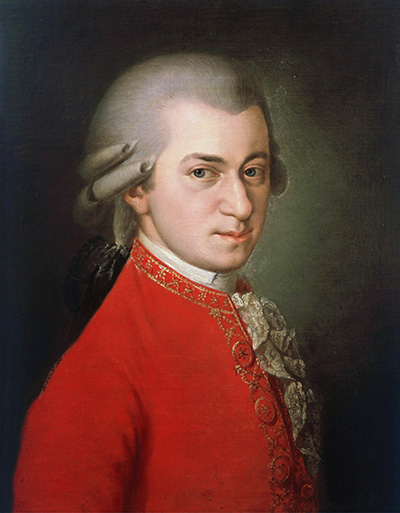
- Born: January 27, 1756 in Salzburg, Austria
- Died: December 5, 1791 in Vienna, Austria
- Work Composed: 1782, but left unfinished
- Premiere: October 26, 1783 in Salzburg, Austria
- Instrumentation: SSTB soloists, SATB chorus, flute, 2 oboes, 2 bassoons, 2 horns, 2 trumpets, 3 trombones, timpani, organ, strings
- CSO Notable Performances: First Performance: May Festival, May 1968, Robert Shaw conducting. Most Recent: May Festival, May 2016, James Conlon conducting. This work has appeared on two CSO subscription programs: September 1989, Jesús López Cobos conducting and January 2007, Paavo Järvi conducting.
- Duration: 56 minutes
The origins of what many consider Mozart’s greatest choral work remain as mysterious as the origins of his last three symphonies. As he had left the service of the Archbishop of Salzburg the year before starting work on the C Minor Mass, he was no longer required to write church music. Why, then, did he undertake the composition of such a large piece? It is known that the composer began writing it in 1782 while courting his future wife, and one of his letters suggests that Mozart composed the mass in reciprocation for Constanze’s promise to marry him. The letter also implies that he may have written the music to inspire her recovery from an illness. In either case, it remains hard to understand why a massive liturgical work in an archaic and contrapuntally learned style would be appropriate for Constanze.
The biggest mystery is why the composer left the work unfinished. There is no evidence to suggest that it was ever complete, yet it probably was performed for the first time in Salzburg on October 26, 1783. For the premiere, were portions of earlier Mozart masses inserted in the places where the C Minor Mass provided no music? The composer completed 12 sections of the text, but he apparently never set the final two portions of the Credo or any of the Agnus Dei. Furthermore, the completed parts of the Credo lack various instrumental and vocal parts.
Mozart certainly had sufficient time to complete the work. He and Constanze went to Salzburg some three months before the scheduled premiere, in order to try to win for the composer’s wife the affections of his father and sister. Constanze probably sang the mass’s soprano II solos at the premiere, in order to impress her new family. Since neither father nor sister warmed up to Wolfgang’s bride, the composer may have felt it was futile to finish the piece in time for Constanze to perform in it. Another possibility is that the work’s contrapuntal style, which Mozart had learned from recent acquaintance with choral music of Bach and Handel, never became second nature to the young composer and thus he abandoned his attempt at composing a large-scale work in the tradition of the baroque masters. At this time in his life Mozart also began but did not complete several fugues and other works inspired by baroque counterpoint.
The day after the performance, the young Mozarts left Salzburg, never to return. The composer took the mass with him, but he never again worked on it. Several years after his death, Constanze sold most of the mass, along with nearly 300 other works, to publisher Johann Anton André. When André found another copy of much of the work in a German monastery, he was able to piece together what is probably all that Mozart ever composed of the mass. After publishing the work, André apparently lost some of the manuscript pages. Here the story becomes more confusing. An 1882 publication by musicologist Philipp Spitta relied on a combination of the remaining manuscript pages and André’s edition, and in 1901 a version was issued that included portions of other Mozart masses and a mass movement thought to be by Mozart but actually composed by Johann Ernst Eberlin. This version was circulated and performed widely but is now discredited.
In 1956 musicologist H.C. Robbins Landon prepared a new version without the benefit of seeing Mozart’s manuscript, which was owned by the Prussian State Library and thought to have perished from its supposedly safe location at the Benedictine Monastery of Grüssau during World War II. Landon had to rely on the old André and Spitta editions, but was able to fill in some missing instrumental and vocal parts. However, he made no effort to provide music for totally nonexistent passages. The Landon publication, despite its having been made without consulting the manuscript, is actually closer to the original.
We know this because the Grüssau manuscripts were in fact not destroyed. At the end of the war, various “safe” sites where the Prussian State Library’s holdings were hidden fell into the possession of both West and East Germany. The Grüssau site remained under East German control, and the State Library refused to enumerate the holdings it had regained. Thus, scholars in the West had no idea which of the remaining manuscripts were in the East and which had been truly lost.
In 1961, the East German Library finally published some incomplete information about manuscripts in its possession. When the list was made available in the West in 1968, it contained some astonishing findings: manuscripts of great importance in many fields, including nearly 200 manuscripts by 22 of Germany’s greatest composers. Mozart was represented by 98 items, fully a quarter of all his music known to have survived in manuscript, including the C Minor Mass and the Jupiter and Prague symphonies. (These were not, of course, previously unknown works, but rather pieces that had come down to us in unreliable editions.)
At last scholars gained access to the collection, and in 1983 a facsimile of Mozart’s manuscript was published. Not all of the score of the C Minor Mass was in the Grüssau collection, but those parts that did turn up showed what Mozart’s intentions had been. Unfortunately, the newly rediscovered materials offered no new insights into why the composer never finished the mass. A new performing edition, based on the manuscript wherever possible, was issued in 1987. The version you will hear tonight has been completed by Louis Langrée and is based on the 1987 edition.
Mozart’s overriding influence while working on the C Minor Mass was Bach’s B Minor Mass. Like Bach’s work, the C Minor Mass divides each large section of the liturgy into several distinct movements. Also like the B Minor Mass, Mozart’s work contains several fugues. The arias, on the other hand, are distinctly operatic, which has led some critics to accuse the work of stylistic inconsistency. Possibly Mozart left the work unfinished because he sensed an irreconcilable conflict between his natural homophonic language and the contrapuntal rigors he had borrowed from Bach.
—Jonathan D. Kramer
Artists
-
Music Director, Louise Dieterle Nippert & Louis Nippert Chair
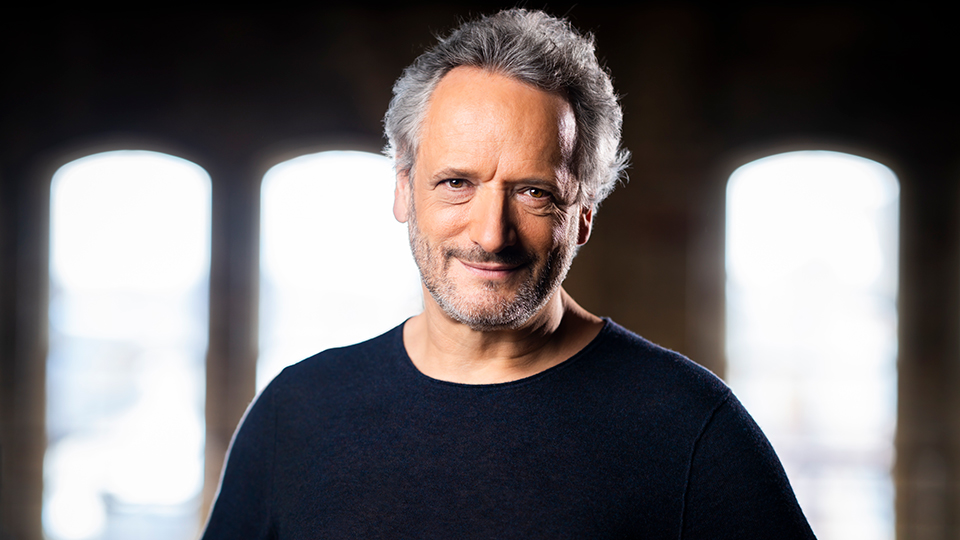
Credit: Chris Lee Louis Langrée has been Music Director of the Cincinnati Symphony Orchestra since 2013, Music Director of the Mostly Mozart Festival at Lincoln Center since 2003 and recently appointed Director of Théâtre national de l'Opéra Comique. Known for imaginative programming, Langrée began his Cincinnati tenure with Jennifer Higdon’s On a Wire with Eighth Blackbird; Copland’s A Lincoln Portrait, narrated by Maya Angelou; and Beethoven’s Fifth Symphony. Two of his Cincinnati recordings were Grammy-nominated for Best Orchestral Performance: Transatlantic, with works by Varèse, Gershwin, and Stravinsky; and Concertos for Orchestra, featuring world premieres by Sebastian Currier, Thierry Escaich, and Zhou Tian. His Pelléas et Mélisande trilogy contrasted settings by Fauré, Debussy, and Schoenberg. A multi-season Beethoven [R]evolution cycle has paired the symphonies with world premieres and 20th-century masterworks, as well as recreation of the legendary 1808 Akademie. During the COVID pandemic, Langrée was a catalyst for the Orchestra’s return to the stage in the fall of 2020 with a series of digitally streamed concerts, and then in January 2021 welcoming in-person audiences to Music Hall.
Between the start of his tenure and the conclusion of the CSO’s upcoming 2021-22 season, Langrée and the CSO will have commissioned or co-commissioned 36 new orchestral works and he will have conducted 30 premieres from a wide range of composers, including Julia Adolphe, Daníel Bjarnason, Jennifer Higdon, Jonathan Bailey Holland, Kinds of Kings, David Lang, Missy Mazzoli, Nico Muhly, Caroline Shaw, Julia Wolfe., and the world premiere of Christopher Rouse’s Symphony No. 6, his final opus. Langrée and the Orchestra also commissioned 20 composers to write solo instrument fanfares for CSO musicians during the COVID pandemic, including Michael Abels, Marcos Balter, Peter Boyer, Courtney Bryan, Bryce Dessner, Ted Hearne, Tyshawn Sorey, Georgia Stitt and Du Yun, whose new works were premiered on the Orchestra’s website.
To date, Langrée has appointed 17 of the Orchestra’s musicians, including hiring Stefani Matsuo as the Orchestra’s first female Concertmaster. Other appointments include Associate Principal Percussion, Associate Principal Second Violin, First Assistant Concertmaster, Assistant Principal Horn, Principal Tuba, Principal Clarinet, Second/Assistant Principal Trombone, Principal Bassoon, Second Flute, Second Oboe, three section violists, two section violins, and a section cellist. In the coming season, there will be auditions for Associate Principal Timpani and section percussion, Associate Concertmaster, Associate Principal Flute, Piccolo, and Section Bass. Langrée has also worked closely with the CSO/CCM Diversity Fellows, mentoring them individually and welcoming them to perform within the Orchestra.
A regular presence at Lincoln Center since his 1998 debut, Langrée has conducted around 250 concerts and productions, including more than 50 Metropolitan Opera performances; has taught Juilliard School masterclasses; appeared with the CSO as part of Lincoln Center’s Great Performers series; and made his New York Philharmonic guest conducting debut in March, 2020. Langrée has raised the artistic profile and repertoire of the Festival Orchestra well beyond the classical period, from Lully to Magnus Lindberg.
An advocate for the music of our time, Langrée has conducted premieres by Julia Adolphe, Daníel Bjarnason, Anna Clyne, Jonathan Bailey Holland, David Lang, Nico Muhly, André Previn, Caroline Shaw, and Julia Wolfe among numerous others including, with the CSO, the world premiere of Christopher Rouse’s Symphony No. 6, the composer’s final opus. Among the many period-instrument ensembles he has worked with are the Orchestra of the Age of Enlightenment, Freiburg Baroque, Concerto Köln, and Orchestre des Champs-Elysées.
Louis Langrée has guest conducted the Berlin Philharmonic, Vienna Philharmonic, London Philharmonic, Philadelphia Orchestra, Budapest Festival Orchestra, Czech Philharmonic, NHK Symphony, Orchestre National de France, Orchestre de Paris, and Leipzig Gewandhaus among others. In addition to the Met, he frequently conducts at the leading opera houses including the Vienna Staatsoper, Teatro alla Scala, Royal Opera House, Covent Garden, Lyric Opera of Chicago, and Bavarian Staatsoper, and at festivals including Glyndebourne, Aix-en-Provence, BBC Proms, Edinburgh International, and the Hong Kong Arts Festival.
Langrée was previously music director of the Orchestre de Picardie, Opéra National de Lyon, Glyndebourne Touring Opera, Orchestre Philharmonique Royal de Liège, and chief conductor of the Camerata Salzburg. A native of Alsace, France, he is a Chevalier des Arts et des Lettres and Chevalier de la Légion d’Honneur.
-
Jennifer Koh, violin
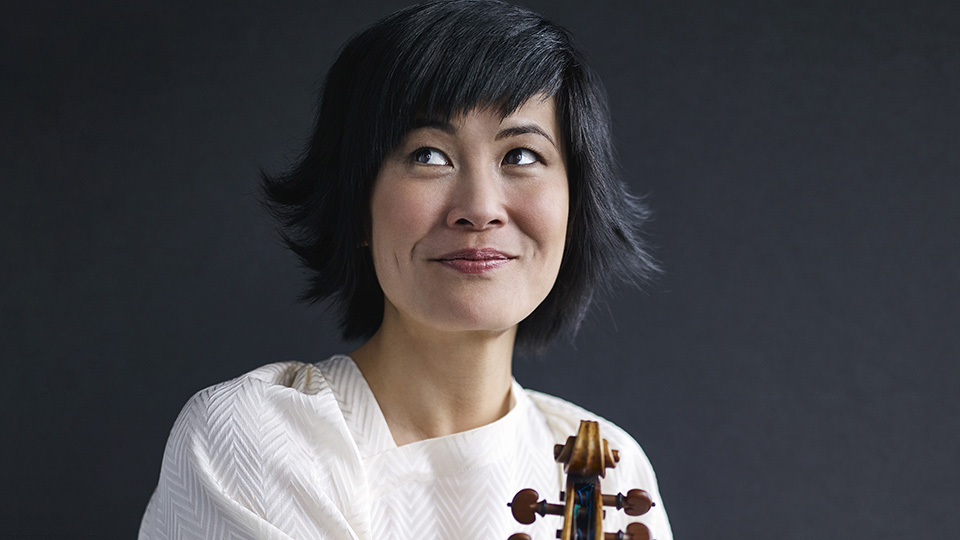
Credit: Juergen Frank Recognized for intense, commanding performances delivered with dazzling virtuosity and technical assurance, violinist Jennifer Koh is a forward-thinking artist dedicated to exploring a broad and eclectic repertoire, while promoting equity and inclusivity in classical music. She has expanded the contemporary violin repertoire through a wide range of commissioning projects and has premiered more than 100 works written especially for her. Her quest for the new and unusual, sense of endless curiosity, and ability to lead and inspire a host of multidisciplinary collaborators, truly set her apart.
Her critically acclaimed series include Alone Together, Bach and Beyond, The New American Concerto, Limitless, Bridge to Beethoven, and Shared Madness. Coming this season to Carnegie’s Zankel Hall, the Kennedy Center and Cincinnati’s Music Hall, The New American Concerto is Koh’s ongoing, multi-season commissioning project that explores the form of the violin concerto and its potential for artistic engagement with contemporary societal concerns and issues, through commissions from a diverse collective of composers. In February and March 2022, she premieres Missy Mazzoli’s Violin Concerto with the National Symphony Orchestra conducted by Gemma New at the Kennedy Center and with the Cincinnati Symphony Orchestra conducted by Louis Langrée at Music Hall. Mazzoli’s concerto is the sixth to have been commissioned as part of the project, and Koh premieres the work having earlier in the season performed solo and chamber music by Mazzoli in San Francisco alongside the composer herself. Also in March 2022, Koh gives the New York premiere of Lisa Bielawa’s violin concerto, Sanctuary, at Carnegie’s Zankel Hall with the American Composers Orchestra. Originally premiered in 2020 with co-commissioner the Orlando Philharmonic, the concerto explores the meaning of the word “sanctuary”—which holds new prominence and resonance in our current cultural climate—in order to reach a greater understanding of its layered meaning within American consciousness. Additional New American Concerto commissions are Tyshawn Sorey’s for Marcos Balter, premiered with the Detroit Symphony Orchestra in 2020; Courtney Bryan’s Syzygy, premiered with the Chicago Sinfonietta in 2020; Christopher Cerrone’s Breaks and Breaks, premiered with the Detroit Symphony Orchestra in 2018; and Vijay Iyer’s Trouble premiered at the 2017 Ojai Music Festival.
In addition to continuing her existing projects, Koh unveils two new collaborations this season—Everything Rises with bass-baritone Davóne Tines and Bach 6 Solo with director Robert Wilson and choreographer Lucinda Childs. Everything Rises, whose premiere performances are presented by UCLA and UC Santa Barbara in April 2022, is an evening-length musico-theatrical experience borne of Koh’s and Tines’ own experiences as artists of color in a culture dominated by whiteness. Their collective exploration led them back to their family histories—to the stories of Koh’s mother, Gertrude Soonja Lee Koh, a refugee from North Korea during the Korean War, and Tines’ grandmother, Alma Lee Gibbs Tines, who holds vivid memories of anti-Black discrimination and violence dating back many years. These experiences—of the artists and their families—are both the inspiration for and subject matter of this project. Furthermore, during the years in which Everything Rises has been in development, there has been a new surge of activism against racist violence targeting Black and Asian Americans. Inspired by the recent outpouring of support and solidarity across racial identities, this new work proposes a united front through music.
In September 2021, nearly a decade after collaborating in revival performances of Philip Glass’ Einstein on the Beach, Koh reunites with director Robert Wilson and choreographer Lucinda Childs for a new work, Bach 6 Solo, that brings to life Bach’s sonatas and partitas with theatrical elements and dance. Conceived by Koh and Wilson, the new work has Koh performing all six of Bach’s Partitas and Sonatas—widely considered the pinnacle of solo violin writing and typically performed alone on stage—with four dancers performing choreography by Childs. Performances take place at the Chapelle Saint-Louis de la Salpêtrière as part of the Festival d’Automne à Paris. Koh also performs selected Bach sonatas and partitas in Boston and Schenectady this season.
Additional highlights of Koh’s 2021–22 season are two new recordings on Cedille Records: Alone Together and the complete box set of her Bach & Beyond trilogy. Originally launched as a commissioning project and virtual performance series, Alone Together was developed in response to the coronavirus pandemic and the financial hardship it placed on many in the arts community. The project brought composers together in support of the many freelancers among them—with the more established composers each donating a new micro-work for solo violin, while also recommending a fellow freelance composer to write their own solo violin micro-work on paid commission from Koh’s artist-driven nonprofit ARCO Collaborative. The new album, released in August 2021, features 39 world premiere recordings, including works by Du Yun, George Lewis, Tania Léon, Andrew Norman, Missy Mazzoli, Ellen Reid, Vijay Iyer, Nina C. Young, and Angélica Negrón. The reopening of concert halls around the U.S. has also allowed Koh to perform Alone Together recitals in-person for live audiences, with 2021–22 performances including recitals at the University of Notre Dame and as part of a teaching residency at Seoul National University.
Koh’s Bach & Beyond recording series was originally released by Cedille Records in three installments (2012, 2015 and 2020), which were released as a three-disc box set in September 2021. These recordings explore the history of the solo violin repertoire from Bach’s Six Sonatas and Partitas to the music of 20th- and 21st-century composers, including new commissions from Missy Mazzoli (Dissolve, O My Heart) and John Harbison (For Violin Alone). The collection also includes the world premiere recording of Kaija Saariaho’s Frises, as well as works by Berio, Bartók and Ysaÿe. Koh first launched Bach & Beyond as a three-part recital series in 2009, and she continues to perform these programs regularly, including this season at UMass Amherst. These performances and the three recordings have received widespread critical acclaim, with the Chicago Tribune describing the recordings as an “epic traversal of solo violin repertoire” and “a monumental achievement.”
Koh also continues to perform music from her Bridge to Beethoven project—launched in collaboration with her frequent recital partner, Shai Wosner, in 2015—which pairs Beethoven’s violin sonatas with new and recent works inspired by them in order to explore the composer’s impact and significance on a diverse group of musicians. This season’s Bridge to Beethoven concerts take place in Philadelphia and Princeton with pianist Thomas Sauer.
Koh regularly performs a broad range of concertos that reflects the breadth of her musical interests from traditional to contemporary. Her orchestral appearances have included performances of such traditional repertoire as Bach’s Violin Concerti with Orpheus Chamber Orchestra; Dvořák’s Violin Concerto with the Pittsburgh Symphony led by Manfred Honeck and RAI National Symphony with James Conlon; Mozart’s Violin Concerto No. 1 with the Los Angeles Philharmonic led by Bramwell Tovey and St. Louis Symphony led by Nicolas McGegan; Tchaikovsky’s Violin Concerto with the Munich Philharmonic led by Lorin Maazel; and Vivaldi’s The Four Seasons with the Detroit Symphony led by Nicolas McGegan.
She has performed 20th-century works including Bartók and Berg concerti with the Milwaukee Symphony led by Edo de Waart; Bernstein’s Serenade with the Minnesota Orchestra led by Juanjo Mena and The Philadelphia Orchestra led by Yannick Nézet-Séguin; Lutosławski’s Chain 2 with the New York Philharmonic led by Lorin Maazel and the Philharmonia Orchestra with Esa-Pekka Salonen; Scelsi’s Anahit with the Los Angeles Philharmonic led by Gustavo Dudamel; and Sibelius’ Violin Concerto with the New Jersey Symphony led by Xian Zhang, the São Paulo Symphonies with Marin Alsop, and the Columbus Symphony led by Rossen Milanov. This season, she performs the Sibelius concerto with the Suwon Philharmonic in South Korea. An advocate for music from our current millennium, she has performed Anna Clyne’s The Seamstress with the BBC Symphony led by Sakari Oramo, the Chicago Symphony led by Ludovic Morlot, and the Cincinnati Symphony conducted by Louis Langrée; Esa-Pekka Salonen’s Violin Concerto with the Houston Symphony led by Christoph Eschenbach, Nashville Symphony conducted by Giancarlo Guerrero, and Cincinnati and Gothenburg symphonies conducted by Santtu-Matias Rouvali; and Steven Mackey’s Beautiful Passing with the Baltimore Symphony under Marin Alsop.
Koh played the role of Einstein in the revival of Philip Glass and Robert Wilson’s Einstein on the Beach from 2012 to 2014; and a particular highlight of her career was performing with St. Vincent (Annie Clark) and S. Epatha Merkerson at the 2018 Kennedy Center Honors in a tribute to Glass. She has also performed for former First Lady of the United States Michelle Obama and former First Lady of South Korea Kim Yoon-ok in 2011.
Koh brings the same sense of adventure and brilliant musicianship to her recordings as she does to her live performances. She has recorded more than a dozen albums with Chicago-based Cedille Records. In addition to the above, her recordings for the label in recent years include 2019’s Limitless, on which leading composer-performers—including Lisa Bielawa, Vijay Iyer, Missy Mazzoli, Qasim Naqvi, Tyshawn Sorey, Wang Lu, Nina C. Young, and Du Yun—perform duo compositions with Koh that explore the artistic relationship between composer and performer, and a 2018 collection of works by Kaija Saariaho, whose music she has long championed and with whom she has closely collaborated. Titled Saariaho X Koh, the album includes the chamber version of the violin concerto Graal Théâtre with the Curtis Chamber Orchestra; Cloud Trio with violist Hsin-Yun Huang and cellist Wilhelmina Smith; Tocar with pianist Nicolas Hodges; Aure with cellist Anssi Karttunen, with whom she premiered the violin and cello version in 2015; and Light and Matter with both Hodges and Karttunen, with whom she performed the French premiere in 2017.
Her discography on Cedille Records also includes Tchaikovsky: Complete Works for Violin and Orchestra with the Odense Symphony Orchestra conducted by Alexander Vedernikov; Two x Four in collaboration with her former teacher, violinist Jaime Laredo, and featuring double violin concerti by Bach, Philip Glass, and new commissions from Anna Clyne and David Ludwig; Signs, Games + Messages, a recording of violin and piano works by Janáček, Bartók, and Kurtág with Shai Wosner; Rhapsodic Musings: 21st Century Works for Solo Violin; the Grammy-nominated String Poetic, featuring the world premiere of Jennifer Higdon’s eponymous work, performed with pianist Reiko Uchida; Schumann’s complete violin sonatas, also with Uchida; Portraits with the Grant Park Orchestra under conductor Carlos Kalmar with concerti by Szymanowski, Martinů, and Bartók; Violin Fantasies, fantasies for violin and piano by Schubert, Schumann, Schoenberg, and saxophonist Ornette Coleman, again with Uchida; and Koh’s first Cedille album, from 2002, Solo Chaconnes, an earlier reading of Bach’s Second Partita coupled with chaconnes by Richard Barth and Max Reger. She is also the featured soloist on a recording of Higdon’s The Singing Rooms with the Atlanta Symphony led by Robert Spano for Telarc.
Koh is active not only in the concert hall and recording studio, but also as a lecturer and teacher. She has been on faculty at the Mannes School of Music since 2018 and has held residencies at Brown, Cornell, Duke and Tulane universities, as well as at the Curtis Institute of Music, Oberlin Conservatory and College, and University of California, Santa Barbara. She was the keynote speaker for the Royal College of Music’s 2020 “Orchestrating Isolation” conference and the League of American Orchestras’ 2018 annual conference.
She is the Founder and Artistic Director of ARCO Collaborative, an artist-driven nonprofit that advocates for inclusivity in classical music. Established in 2014, ARCO Collaborative commissions, develops, and produces new musical works that highlight artists of color and women composers in collaborations that bring forth stories previously unheard in Western art forms. She is also a member of Composers Now’s Distinguished Mentors Council and the board of the League of American Orchestras.
Born in Chicago of Korean parents, Koh began playing the violin by chance, choosing the instrument in a Suzuki-method program only because spaces for cello and piano had been filled. She made her debut with the Chicago Symphony Orchestra at age 11. She was Musical America’s 2016 Instrumentalist of the Year and has also been recently recognized as a Virtuoso Award honoree by Concert Artists Guild in 2020 and “A Force of Nature” by the American Composers Orchestra in 2019. She was a top prize winner at Moscow’s International Tchaikovsky Competition, winner of the Concert Artists Guild Competition, and a recipient of an Avery Fisher Career Grant. She has a Bachelor of Arts degree in English literature from Oberlin College and studied at the Curtis Institute, where she worked extensively with Jaime Laredo and Felix Galimir.
For further information, visit jenniferkoh.com.
August 2021
-
Missy Mazzoli, composer
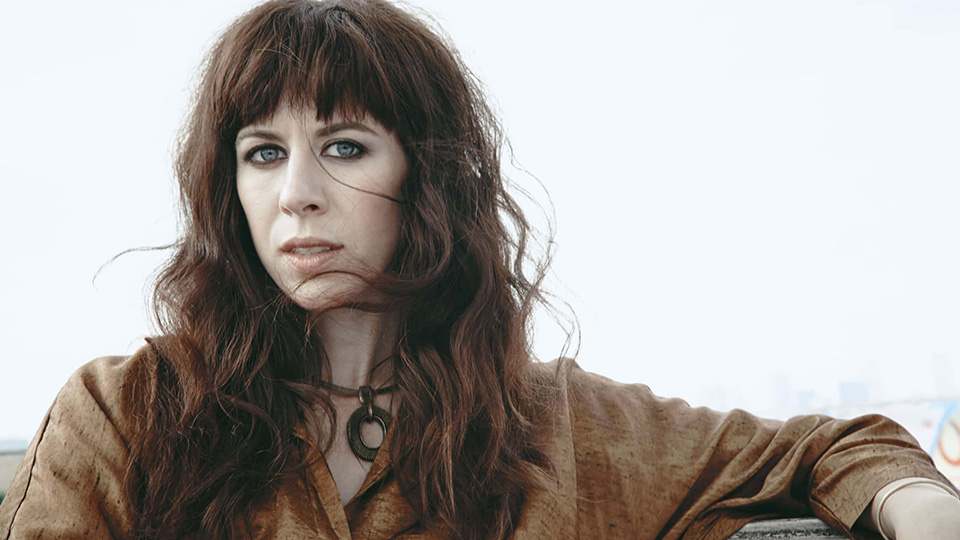
Credit: Marylene Mey Grammy-nominated composer Missy Mazzoli was recently deemed “one of the more consistently inventive, surprising composers now working in New York” (The New York Times) and “Brooklyn’s post-millennial Mozart” (Time Out New York), and she has been praised for her “apocalyptic imagination” (Alex Ross, The New Yorker). Mazzoli is the Mead Composer-in-Residence at the Chicago Symphony Orchestra, and her music has been performed all over the world by the Kronos Quartet, eighth blackbird, pianist Emanuel Ax, Opera Philadelphia, Scottish Opera, LA Opera, Cincinnati Opera, New York City Opera, Chicago Fringe Opera, the Detroit Symphony, the LA Philharmonic, the Minnesota Orchestra, the American Composers Orchestra, the Boston Symphony, JACK Quartet, cellist Maya Beiser, violinist Jennifer Koh, pianist Kathleen Supové, Dublin’s Crash Ensemble, the Sydney Symphony and many others. In 2018 she made history when she became one of the two first women (along with composer Jeanine Tesori) to be commissioned by The Metropolitan Opera. That year she was also nominated for a Grammy in the category of “Best Classical Composition” for her work Vespers for Violin, recorded by violinist Olivia De Prato.
Mazzoli has received considerable acclaim for her operatic compositions. Her third opera, Proving Up, written with longtime collaborator Royce Vavrek, was commissioned by Washington National Opera, Opera Omaha and New York’s Miller Theatre. Based on a short story by Karen Russell, Proving Up offers a surreal and disquieting commentary on the American dream through the story of a Nebraska family homesteading in the late 19th century. Proving Up premiered to critical acclaim in January 2018 at Washington D.C.’s Kennedy Center, in April 2018 at Opera Omaha, and in September 2018 at Miller Theatre. The Washington Post called it “harrowing…powerful…a true opera of our time.” Mazzoli’s second opera, Breaking the Waves, a collaboration with librettist Royce Vavrek commissioned by Opera Philadelphia and Beth Morrison Projects in 2016, was described as “among the best 21st-century operas yet” (Opera News), “savage, heartbreaking and thoroughly original” (Wall Street Journal), and “dark and daring” (New York Times). Earlier projects include the critically acclaimed sold-out premiere of Mazzoli’s first opera, Song from the Uproar, in a Beth Morrison production at New York venue The Kitchen in March 2012. The Wall Street Journal called this work “powerful and new,” and The New York Times claimed that “in the electric surge of Ms. Mazzoli’s score you felt the joy, risk, and limitless potential of free sprits unbound.” Time Out New York named Song from the Uproar Number 3 on its list of the top ten classical music events of 2012. In October 2012, Mazzoli’s operatic work, SALT, a re-telling of the story of Lot’s Wife written for cellist Maya Beiser and vocalist Helga Davis, premiered as part of the BAM Next Wave Festival and at UNC Chapel Hill, directed by Robert Woodruff. This work, including text by Erin Cressida Wilson, was deemed “a dynamic amalgamation that unapologetically pushes boundaries” by Time Out New York.
Mazzoli is currently the Mead Composer-in-Residence at the Chicago Symphony Orchestra. From 2012 to 2015 she was Composer-in-Residence with Opera Philadelphia, Gotham Chamber Opera and Music-Theatre Group, and in 2011–12 was Composer/Educator in residence with the Albany Symphony. Mazzoli was a visiting professor of music at New York University in 2013, and later that year joined the composition faculty at the Mannes College of Music, a division of the New School. From 2007 to 2011 she was Executive Director of the MATA Festival in New York, and in 2016, Along with composer Ellen Reid and in collaboration with the Kaufman Music Center, Mazzoli founded Luna Composition Lab, a mentorship program and support network for female-identifying, non-binary and gender nonconforming composers ages 13–19.
Last season included performances of her second opera Breaking the Waves at the Edinburgh International Festival and the Adelaide Festival, a performance of her opera Proving Up at the Aspen Music Festival, the world premiere of Orpheus Alive, a new ballet score commissioned and premiered by the National Ballet of Canada, the US premiere of her double bass concerto Dark with Excessive Bright with the St. Paul Chamber Orchestra, and performances of her work by the Los Angeles Chamber Orchestra, San Francisco Symphony, Colorado Symphony and the Opera National Bordeaux, among others. Mazzoli also curated concerts with the San Francisco Symphony and the Chicago Symphony. Her next opera, The Listeners, commissioned by the Norwegian National Opera and Opera Philadelphia, and created in collaboration with playwright Jordan Tannahill, librettist Royce Vavrek and director Lileana Blain-Cruz, premiered in March 2021 in Oslo. Next season will also feature the world premiere of Orpheus Undone, an orchestral work commissioned by the Chicago Symphony.
Mazzoli is an active TV and film composer, and recently wrote and performed music for the fictional character Thomas Pembridge on the Amazon TV show Mozart in the Jungle. She also contributed music to the documentaries Detropia and Book of Conrad and the film A Woman, A Part. Mazzoli’s music has been recorded and released on labels including New Amsterdam, Cedille, Bedroom Community, 4AD and Innova. Artists who have recorded Mazzoli’s music include eighth blackbird (whose Grammy-winning 2012 CD Meanwhile opened with Mazzoli’s work Still Life with Avalanche), Roomful of Teeth, violinist Jennifer Koh, violist Nadia Sirota, NOW Ensemble, Newspeak, pianist Kathleen Supové, the Jasper Quartet, and violinist Joshua Bell, who recorded Mazzoli’s work for the Mozart in the Jungle soundtrack.
Mazzoli is an active pianist and keyboardist, and often performs with Victoire, a band she founded in 2008 dedicated to her own compositions. Their debut full-length CD, Cathedral City, was named one of 2010′s best classical albums by Time Out New York, NPR, The New Yorker and The New York Times, and it was followed by the critically acclaimed Vespers for a New Dark Age, a collaboration with percussionist Glenn Kotche. Vespers was released in March 2015 on New Amsterdam Records along with Mazzoli’s own remixes of the work and a remix of her piece A Thousand Tongues by longtime collaborator Lorna Dune. The New York Times called Vespers for a New Dark Age “ravishing and unsettling,” and the album was praised on NPR’s First Listen, All Things Considered and Pitchfork. In the past decade they have played in venues all over the world including Carnegie Hall, the M.A.D.E. Festival in Sweden, the C3 Festival in Berlin and Millennium Park in Chicago. Victoire returned to Carnegie Hall in March of 2015 as part of the “Meredith Monk and Friends” concert, performing Mazzoli’s arrangements of Monk’s work.
Mazzoli is the recipient of a 2019 Grammy nomination, the 2017 Music Critics Association of America Inaugural Award for Best Opera, the 2018 Goddard Lieberson Fellowship from the American Academy of Arts and Letters, a 2015 Foundation for Contemporary Arts Award, four ASCAP Young Composer Awards, a Fulbright Grant to The Netherlands, the Detroit Symphony’s Elaine Lebenbom Award, and grants from the Jerome Foundation, American Music Center, and the Barlow Endowment. She has been awarded fellowships from the MacDowell Colony, Yaddo, Ucross, VCCA, the Blue Mountain Center and the Hermitage.
Mazzoli attended the Yale School of Music, the Royal Conservatory of the Hague, and Boston University. She has studied with (in no particular order) David Lang, Louis Andriessen, Martin Bresnick, Aaron Jay Kernis, Martijn Padding, Richard Ayres, John Harbison, Charles Fussell, Martin Amlin, Marco Stroppa, Ladislav Kubík, Louis deLise and Richard Cornell.
Her music is published by G. Schirmer.
-
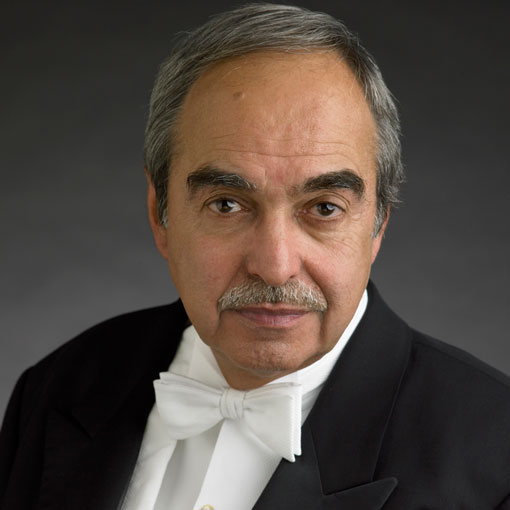
Robert Porco has been recognized as one of the leading choral musicians in the U.S., and throughout his career he has been an active preparer and conductor of choral and orchestral works, including most of the major choral repertoire, as well as of opera. A highlight of his career was leading an Indiana University student choral and orchestral ensemble of 250 in a highly acclaimed performance of Leonard Bernstein’s MASS as part of the Tanglewood Music Festival’s celebration of the composer’s 70th birthday. In 2011 Porco received Chorus America’s “Michael Korn Founders Award for Development of the Professional Choral Art.” In 2016 he led the May Festival Chorus and Cincinnati Symphony Orchestra in a performance of Mendelssohn’s Elijah for Chorus America’s National Conference.
Porco’s conducting career has spanned geographic venues and has included performances in the Edinburgh Festival; Taipei, Taiwan; Lucerne, Switzerland; Tel Aviv and Jerusalem, Israel; and Reykjavik, Iceland; and at the May Festival, Tanglewood Music Festival, Berkshire Music Festival, Blossom Festival and Grant Park Festival. He has been a guest conductor at the May Festival and with the Cincinnati Symphony Orchestra and The Cleveland Orchestra, among others.
The 2021-2022 season is Robert Porco’s 33rd as Director of Choruses.
-
Kathryn Mueller, soprano
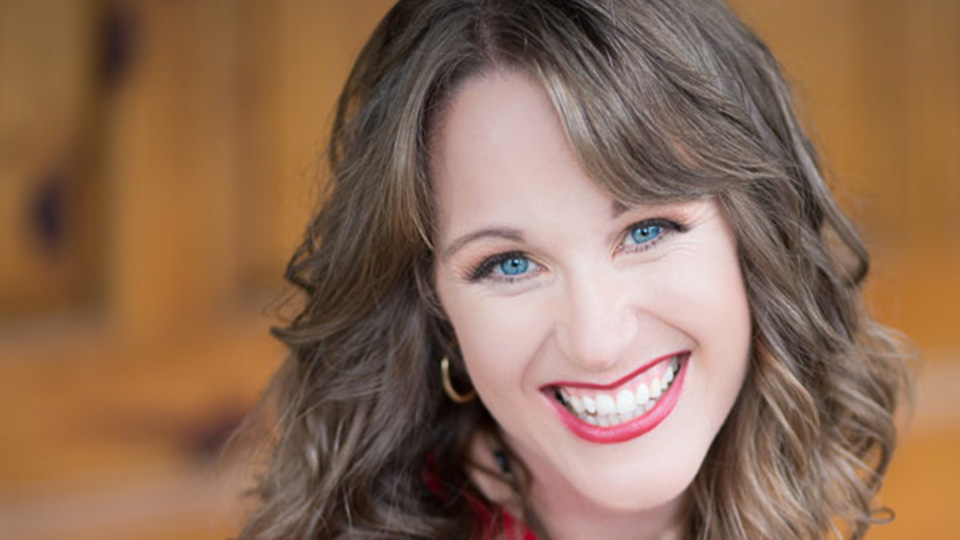
American soprano Kathryn Mueller thrills and connects with audiences with her crystalline sound, personal warmth and musicianship. She sings a wide range of repertoire from period baroque performances to world premieres of new works, and she has been a soloist with the LA Chamber Orchestra, American Bach Soloists, Portland Baroque Orchestra, Santa Fe Pro Musica, Phoenix Symphony, New Mexico Symphony Orchestra, Winston-Salem Symphony and Tucson Symphony Orchestra.
Mueller’s favorite concert works she has performed include Barber’s Knoxville: Summer of 1915, Glière’s Concerto for Coloratura Soprano, Haydn’s The Creation, Bach’s St. John Passion, and anything by Mozart or Handel. She collaborates as a guest artist with the award-winning early music group Wayward Sisters and has also sung operatic roles for Arizona Opera, the North Carolina HIP Music Festival, and Bach Collegium San Diego.
Mueller received a 2015 Grammy© nomination for her solo work on True Concord’s album Far in the Heavens. She has also recorded two Grammy-nominated albums with Seraphic Fire and she is featured as a soloist on recordings by New Trinity Baroque, the Santa Fe Desert Chorale, Tucson Chamber Artists and Seraphic Fire, including Seraphic Fire’s best-selling Monteverdi Vespers of 1610, which reached the top of the iTunes classical chart.
In 2011 Mueller was one of four fellows in the Adams Vocal Master Class at the Carmel Bach Festival. She was a finalist in the 2012 and 2013 Oratorio Society of New York’s Solo Competition, where she won the Frances MacEachron Award in 2013. Her soprano duo Les sirènes was one of six finalist groups in Early Music America’s 2012 Baroque Performance Competition.
A strong advocate for new music, Mueller co-commissioned Reena Esmail’s The History of Red— a concerto-length work for soprano and orchestra based on Chickasaw writer Linda Hogan’s powerful poem of the same name—along with Santa Fe Pro Musica, ROCO, Orlando Philharmonic Orchestra, and The Knights. Mueller also gave the world premiere of Ananda Sukarlan’s song cycle Love and Variations, commissioned for her vocal-piano ensemble, the Swara Sonora Trio. The Swara Sonora Trio followed that successful premiere with a three-week benefit tour across Indonesia, raising funds for UNICEF’s Indonesia Country Office.
Mueller was born in San Francisco and began her musical studies at an elevation of 7,000 feet in the White Mountains of Arizona. Her first solo performance was “Away in a Manger” in church, at age seven. Her first professional gig—a section leader position at a church in Providence—came during high school in Rhode Island, and she continued her vocal studies as an undergraduate at Brown University and then earned a master’s degree in vocal performance from the University of Arizona. Mueller lives in Raleigh, NC with her husband (NCSU choir director Nathan Leaf) and two spirited young children. She belongs to Beyond Artists, a coalition of musicians who donate a percentage of their concert fees to organizations they care about. She supports the Poor People’s Campaign through her performances.
-
Georgia Jarman, soprano
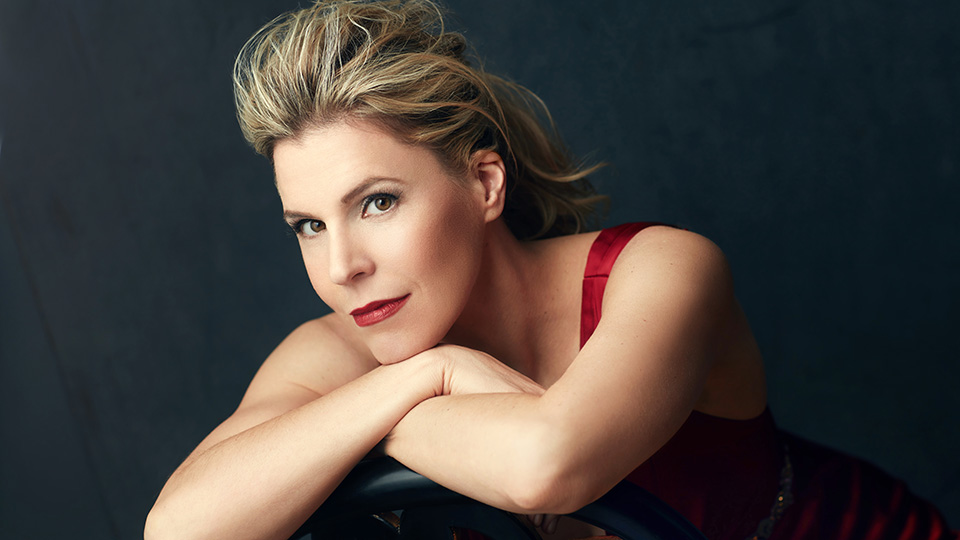
Credit: Claire McAdams Vocal dexterity aligned with a strong theatrical instinct have been key to Georgia Jarman’s numerous successes, in roles spanning lyric and bel canto repertoire alongside a growing reputation in new commissions.
Among those which hold special significance are the landmark compositions of George Benjamin—Written on Skin and Lessons in Love and Violence, which Jarman has debuted at Venice Biennale Musica—under the composer’s baton—and at Staatsoper Hamburg, Gran Teatre del Liceu, Opéra National de Lyon and at the Beijing Music Festival with the Mahler Chamber Orchestra under Lawrence Renes.
Her breakthrough performance and debut at The Royal Opera House, Covent Garden, came as Roxana in Kasper Holten’s spectacular production of Król Roger, seen in cinemas and subsequently released on DVD. Further debuts include Musetta in La bohème for Opernhaus Zürich, Helena in A Midsummer Night’s Dream for Opera Philadelphia, Lucia in Lucia di Lammermoor for Opéra National de Bordeaux, Gilda in Rigoletto for her Santa Fe Festival debut, all four heroines in Richard Jones’ production of The Tales of Hoffmann for English National Opera, the title role in Maria Stuarda for Washington Concert Opera, and Manon at Malmö Opera.
Exploring neglected bel canto repertoire, she has made numerous critically acclaimed appearances at the former Caramoor Summer Music Festival with the Orchestra of St. Luke’s, including, most recently, Zenobia in Rossini’s rarely performed Aureliano in Palmira, alongside Norina in Don Pasquale and Amina in La sonnambula.
Jarman opened the 2020–21 season in Zurich, where she sang her debut performances of Britten’s War Requiem as part of the celebrations to inaugurate the city’s new Grosse Tonhalle under Kent Nagano and the Tonhalle Orchestra. Additional highlights include Berg’s Sieben frühe Lieder with the Oregon Symphony under David Danzmayr and Haydn’s Scena di Berenice with the Atlanta Symphony Orchestra under Dmitry Sinkovsky.
-
Nicholas Phan, tenor
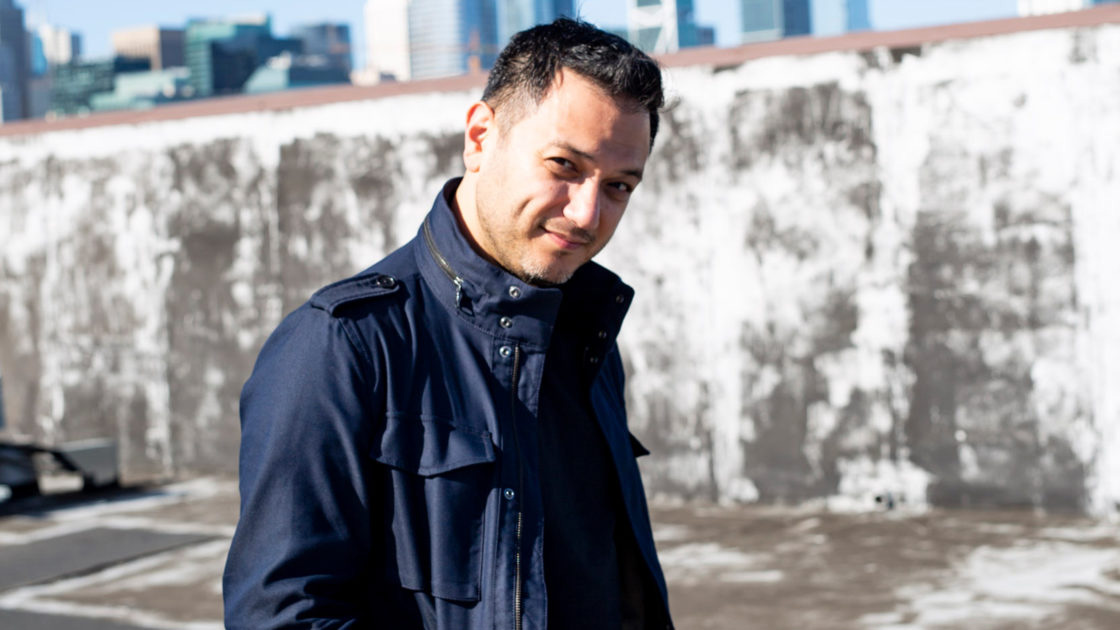
Described by The Boston Globe as “one of the world’s most remarkable singers,” American tenor Nicholas Phan is increasingly recognized as an artist of distinction. Praised for his keen intelligence, captivating stage presence and natural musicianship, he performs regularly with the world’s leading orchestras and opera companies. Also an avid recitalist, in 2010 he co-founded the Collaborative Arts Institute of Chicago (CAIC), to promote art song and vocal chamber music, and serves as its artistic director.
A celebrated recording artist, Phan’s most recent album, Clairières, a recording of songs by Lili and Nadia Boulanger, was nominated for the 2020 Grammy© for Best Classical Solo Vocal Album. His album Gods and Monsters was nominated for the same award in 2017. He is the first singer of Asian descent to be nominated in the history of the category, which has been awarded by the Recording Academy since 1959. His other previous solo albums, Illuminations, A Painted Tale, Still Fall the Rain and Winter Words, made many “best of” lists, including those of The New York Times, New Yorker, Chicago Tribune, WQXR and The Boston Globe. Phan’s growing discography also includes a Grammy-nominated recording of Stravinsky’s Pulcinella with Pierre Boulez and the Chicago Symphony, Berlioz’s Roméo et Juliette with Michael Tilson Thomas and the San Francisco Symphony, Scarlatti’s La gloria di primavera and Handel’s Joseph and his Brethren with Philharmonia Baroque, an album of Bach’s secular cantatas with Masaaki Suzuki and Bach Collegium Japan, Bach’s St. John Passion (in which he sings both the Evangelist and the tenor arias) with Apollo’s Fire, and the world premiere recordings of two orchestral song cycles, The Old Burying Ground by Evan Chambers and A Sunbeam’s Architecture by Elliott Carter.
Phan has appeared with many of the leading orchestras in North America and Europe, including the Cleveland Orchestra, New York Philharmonic, Boston Symphony, Chicago Symphony, San Francisco Symphony, Los Angeles Philharmonic, Philadelphia Orchestra, Bavarian Radio Symphony Orchestra, National Symphony, Atlanta Symphony, St. Paul Chamber Orchestra, Minnesota Orchestra, Orchestra of St. Luke’s, Philharmonia Baroque, Boston Baroque, Les Violons du Roy, BBC Symphony, English Chamber Orchestra, Strasbourg Philharmonic, Royal Philharmonic, Swedish Radio Symphony, Philharmonia Orchestra of London, and Lucerne Symphony. He has toured extensively throughout the major concert halls of Europe and has appeared with the Oregon Bach, Ravinia, Marlboro, Edinburgh, Rheingau, Saint-Denis, and Tanglewood festivals, as well as the BBC Proms. Among the conductors he has worked with are Marin Alsop, Harry Bicket, Herbert Blomstedt, Pierre Boulez, Karina Canellakis, James Conlon, Alan Curtis, Rafael Frühbeck de Burgos, Charles Dutoit, James Gaffigan, Alan Gilbert, Jane Glover, Matthew Halls, Manfred Honeck, Bernard Labadie, Louis Langrée, Cristian Măcelaru, Nicholas McGegan, Zubin Mehta, Riccardo Muti, John Nelson, Yannick Nézet-Séguin, Helmuth Rilling, David Robertson, Esa-Pekka Salonen, Masaaki Suzuki, Michael Tilson Thomas, Bramwell Tovey and Franz Welser-Möst.
An avid proponent of vocal chamber music, he has collaborated with many chamber musicians, including pianists Mitsuko Uchida, Richard Goode, Jeremy Denk, Graham Johnson, Lisa Kaplan, Roger Vignoles, Orion Weiss, Inon Barnatan, Myra Huang and Alessio Bax; violinist James Ehnes; cellist Paul Watkins; guitarist Eliot Fisk; harpist Sivan Magen; the Brooklyn Rider, Jasper, and Spektral string quartets; and horn players Jennifer Montone, Radovan Vlatković, and Gail Williams. In both recital and chamber concerts, he has been presented by Carnegie Hall, London’s Wigmore Hall, the Metropolitan Museum of Art, Chamber Music Society of Lincoln Center, Philadelphia Chamber Music Society, Atlanta’s Spivey Hall, Boston’s Celebrity Series, and the Library of Congress in Washington, DC. In addition to his work as artistic director of CAIC, he also has served as guest curator for projects with the Laguna Beach Music Festival, Philadelphia Chamber Music Society, Merola Opera program, WQXR and San Francisco Performances, where he served as the vocal artist-in-residence from 2014 to 2018.
Phan’s many opera credits include appearances with Los Angeles Opera, Houston Grand Opera, Glimmerglass Festival, Chicago Opera Theater, Seattle Opera, Portland Opera, Glyndebourne Opera, Maggio Musicale in Florence, Deutsche Oper am Rhein and Frankfurt Opera. His growing repertoire includes the title roles in Bernstein’s Candide, Stravinsky’s Oedipus Rex and Handel’s Acis and Galatea, Almaviva in Il barbiere di Siviglia, Nemorino in L’elisir d’amore, Fenton in Falstaff, Tamino in Die Zauberflöte, Don Ottavio in Don Giovanni, and Lurcanio in Ariodante.
A graduate of the University of Michigan, Phan is the 2012 recipient of the Paul C. Boylan Distinguished Alumni Award and the 2018 Christopher Kendall Award. He also studied at the Manhattan School of Music and the Aspen Music Festival and School, and he is an alumnus of the Houston Grand Opera Studio. He was the recipient of a 2006 Sullivan Foundation Award and 2004 Richard F. Gold Career Grant from the Shoshana Foundation.
-
Dashon Burton, bass
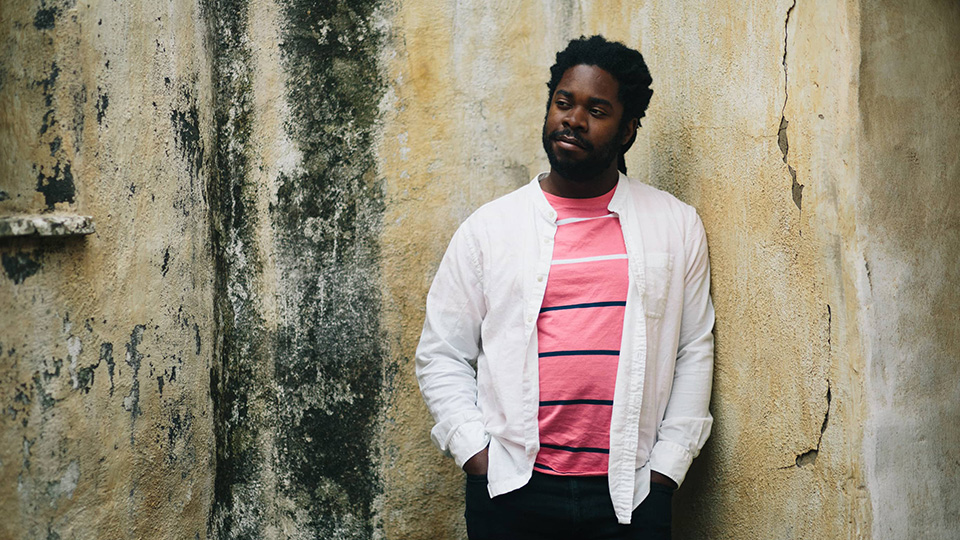
Credit: Tatiana Daubek Dashon Burton has established a vibrant career, appearing regularly throughout the U.S. and Europe in favorite pieces including Bach’s St. John Passion, St. Matthew Passion and Mass in B Minor, as well as Mendelssohn’s Elijah, Beethoven’s Symphony No. 9, Brahms’ Ein deutsches Requiem, Handel’s Messiah and Mozart’s Requiem.
He opened the 2021–22 season with the Handel & Haydn Society of Boston, led by Marin Alsop, for Beethoven’s Symphony No. 9, which he repeats later in the season with the Nashville Symphony and Giancarlo Guerrero. Throughout the season he makes several notable orchestral debuts, including with the Chicago Symphony in Handel’s Messiah led by Nicholas McGegan; with the Los Angeles Philharmonic and Michael Tilson Thomas for the Tilson Thomas’ new song cycle, Meditations on Rilke; with the Pittsburgh Symphony performing Dvořák’s Te Deum under Manfred Honeck; and Verdi’s Requiem with the Seattle Symphony and Thomas Dausgaard.
He continues his relationship with San Francisco Performances as an Artist-in-Residence, with appearances at venues and educational institutions throughout the Bay Area and debuts in recital with Celebrity Series of Boston.
Operatic engagements in recent seasons have included Strauss’ Salome at the Salzburg Festival led by Franz Welser-Möst, Peter Sellars’ production of Claude Vivier’s Kopernikus throughout France and Germany, Sarastro in Mozart’s Die Zauberflöte, and Jupiter in Rameau’s Castor et Pollux with Les Talens Lyriques.
A multiple award-winning singer, Burton won his second Grammy© in March 2021 for Best Classical Solo Vocal Album with his performance featured in Dame Ethyl Smyth’s masterwork The Prison with The Experiential Orchestra (Chandos). He also received top prizes in the ARD International Music Competition, the Oratorio Society of New York’s Vocal Competition, and Bach Bethlehem Vocal Competition.
As an original member of the groundbreaking vocal ensemble Roomful of Teeth, he won his first Grammy Award for their inaugural recording of all new commissions, including Caroline Shaw’s Pulitzer Prize-winning Partita for 8 Voices.
His other recordings include Songs of Struggle & Redemption: We Shall Overcome (Acis), the Grammy-nominated recording of Paul Moravec’s Sanctuary Road (Naxos); Holocaust, 1944 by Lori Laitman (Acis); and Caroline Shaw’s The Listeners with the Philharmonia Baroque Orchestra. His album of spirituals garnered high praise and was singled out by The New York Times as “profoundly moving…a beautiful and lovable disc.”
Burton received a Bachelor of Music degree from Oberlin College and Conservatory and a Master of Music degree from Yale University’s Institute of Sacred Music. He is an assistant professor of voice at Vanderbilt University’s Blair School of Music. -
The May Festival Chorus has earned acclaim locally, nationally and internationally for its musicality, vast range of repertoire and sheer power of sound. The Chorus of 120 avocational singers is the core artistic element of the Cincinnati May Festival as well as the official chorus of the Cincinnati Symphony Orchestra (CSO) and the Cincinnati Pops. Throughout each season the Chorus Members collectively devote more than 40,000 hours in rehearsals and performances.
Founded in 1873, the Cincinnati May Festival is the oldest choral festival in the Western Hemisphere and is distinguished by its unique community-based structure and standard of extraordinary artistic excellence. The annual festival, anchored by the May Festival Chorus and Cincinnati Symphony Orchestra (CSO), hosts an international array of guest artists and presents nine dynamic productions. The Festival is under the leadership of Principal Conductor Juanjo Mena and Director of Choruses Robert Porco.
Many important choral works have received their World and American premieres at the May Festival in the past 150 years, including Johann Sebastian Bach’s Magnificat, Gustav Mahler’s Symphony No. 3, Benjamin Britten’s Gloriana, Gian Carlo Menotti’s The Death of the Bishop of Brindisi, and Robert Nathaniel Dett’s The Ordering of Moses.
The May Festival Chorus has strengthened its national and international presence through numerous PBS broadcasts of live concerts and several award-winning recordings, many in collaboration with the Cincinnati Symphony Orchestra and Cincinnati Pops. Most recently, a live recording of Robert Nathaniel Dett’s The Ordering of Moses featuring Music Director Laureate James Conlon conducting the Chorus and the CSO at Carnegie Hall was released to critical acclaim in 2016 on Bridge Records. In 2001 the Chorus recorded Christmas with the May Festival Chorus, a popular a cappella holiday recording which was re-released on the Fanfare Cincinnati label in 2017, and a 2004 May Festival recording featuring the world premiere recording of Franz Liszt’s St. Stanislaus was awarded the 30th International F. Liszt Record Grand Prix by the Liszt Society of Budapest. The Chorus is also featured on the 2012 Cincinnati Pops release, Home for the Holidays, and several other Pops albums.
The May Festival Chorus has garnered two awards in recognition of its continuing artistic excellence and performances throughout the state. In 2011 the Chorus received the Spirit of Cincinnati USA Erich Kunzel Queen City Advocate Award from Cincinnati USA Convention and Visitors Bureau. In 1998 the Chorus earned the Irma Lazarus Award from the Ohio Arts Council’s annual Governor’s Awards for the Arts. Additionally, in 2021 May Festival earned the BBC Magazine’s distinction as “One of the Best Classical Music Festivals in the US and Canada” and Chorus American recognized the May Festival as a leader in increasing diversity, equality, inclusion and access in the choral world.
May Festival Chorus Roster
-
Soprano
Tracy Bailey
Karen Bastress
Dawn Bruestle
Kathy Dietrich
Jen Dobson
Rachel Dummermuth
Laurel Boisclair Ellsworth
Sarah Grogan
Gaynelle Hardwick
Dana Harms
Lauren Hess
Sara Hook
Alexandra Kesman
Lisa Koressel
Audrey Markovich
Alison Peeno
Lauren Peter
Beth Roberts
Rosie Wilkenson
Samantha ZiegerAlto
Robin Bierschenk
Sarah Fall
Jean Graves
Spence Ingerson
Julie Laskey
Wendy Allen Long
Kathy Loomis
Tiffany Lin
Elaine Lustig
Ashlinn Meechan
Jennifer Moak
Amy Perry
Megan WeaverTenor
Lawrence Adams
David Bower
David Gillespie
Robert Henderson
Robert Lomax
Jason Ramler
Larry Reiring
Matthew Swope
Stephen West
Barry ZaslowBass
Jim Baxter
Scott Brody
Darren Bryant
Lawrence Coleman
Steven Dauterman
Mark Hockenberry
Takuya Konishi
Daniel Parsley
Justin Peter
Joshua Wallace
Mark Weaver
Paul Wessendarp -
Soprano
Maris Bernard
Renee Cifuentes
Ally Clifton
Anita Marie Greer
Melissa Haas
Mary Wynn Haupt
Carolyn Hill
Hyejung Jun
Judy LaChance
Hilary Landwehr
Julia Lawrence
Zohar Perla
Kristi Reed
Justine Samuel
Julie Schieve
Yvon Shore
Samantha Walker
Brittany Weixelbaum
Tricia WilkensAlto
Alaina Arwood
Erika Emody
Kathy Falcón
Amanda Gast
Sally Harper
Beth Huntley
Karolyn Johnsen
Jenifer Klostermeier
Megan Lawson
Kathy Mank
Teri McKibben Amanda Schwarz Rosenzweig
Sarah Stoutamire
Karen VossebergTenor
Avery Bargasse
Douglas Easterling
Tyler Johnson
Fensheng Kong
Kevin Leahy
Andrew Miller
Scott Nesbitt
Adam Shoaff
Jeffrey Stivers
Matthew SwansonBass
Mark Barnes
Kenny Bierschenk
Drew Bowers
Doug Bruestle
Chris Canarie
Steve France
Jim Laskey
John McKibben
Jim Racster
Mitch Radokovich
Brian Reilly
Tommy Wessendarp
Artistic Leadership and Orchestra Roster
-
LOUIS LANGRÉE, CSO Music Director
- Louise Dieterle Nippert & Louis Nippert ChairJOHN MORRIS RUSSELL, Pops Conductor
- Louise Dieterle Nippert & Louis Nippert ChairMatthias Pintscher, CSO Creative Partner
Damon Gupton, Pops Principal Guest Conductor
François López-Ferrer, CSO Associate Conductor
- Ashley and Barbara Ford Chair for Associate ConductorWilbur Lin, Pops Assistant Conductor
- Ashley and Barbara Ford Chair for Assistant ConductorFIRST VIOLINS
Stefani Matsuo
Concertmaster
—Anna Sinton Taft ChairCharles Morey
Acting Associate Concertmaster
—Tom & Dee Stegman ChairPhilip Marten
First Assistant Concertmaster
—James M. Ewell Chair++Eric Bates
Second Assistant Concertmaster
—Serge Shababian ChairKathryn Woolley
—Nicholas Tsimaras–Peter G. Courlas Chair++Anna Reider
—Dianne & J. David Rosenberg ChairMauricio Aguiar§
Minyoung Baik
James Braid
—Marc Bohlke Chair given by Katrin & Manfred BohlkeMichelle Edgar Dugan
Rebecca Kruger Fryxell
Clifford J. Goosmann and Andrea M. Wilson ChairGerald Itzkoff
—Jean Ten Have ChairLois Reid Johnson
—Anne G. & Robert W. Dorsey Chair++Sylvia Mitchell
—Jo Ann & Paul Ward ChairLuo-Jia Wu
SECOND VIOLINS
Gabriel Pegis
Principal
—Al Levinson ChairYang Liu*
—Harold B. & Betty Justice ChairScott Mozlin**
—Henry Meyer ChairKun Dong
Cheryl Benedict
Evin Blomberg§
Rachel Charbel
—Ida Ringling North ChairElizabeth Furuta†
Chika Kinderman
Hyesun Park
Paul Patterson
—Charles Gausmann Chair++Stacey Woolley
—Brenda & Ralph Taylor Chair++VIOLAS
Christian Colberg
Principal
—Louise D. & Louis Nippert ChairPaul Frankenfeld*
—Grace M. Allen ChairJulian Wilkison**
Rebecca Barnes§
Christopher Fischer
Stephen Fryxell
—Melinda & Irwin Simon ChairCaterina Longhi
Denisse Rodriguez-Rivera
Joanne Wojtowicz
CELLOS
Ilya Finkelshteyn
Principal
—Irene & John J. Emery ChairDaniel Culnan*
—Ona Hixson Dater ChairNorman Johns**
—Karl & Roberta Schlachter Family ChairMatthew Lad§
—Marvin Kolodzik ChairSusan Marshall-Petersen
—Laura Kimble McLellan Chair++Hiro Matsuo
Theodore Nelson
—Peter G. Courlas–Nicholas Tsimaras Chair++Alan Rafferty
—Ruth F. Rosevear ChairBASSES
Owen Lee
Principal
—Mary Alice Heekin Burke Chair++James Lambert*
—Thomas Vanden Eynden ChairMatthew Zory, Jr.**+
—Trish & Rick Bryan ChairBoris Astafiev§
Ronald Bozicevich
—Donald & Margaret Robinson ChairRick Vizachero
HARP
Gillian Benet Sella
Principal
—Cynthia & Frank Stewart ChairFLUTES
Randolph Bowman
Principal
—Charles Frederic Goss ChairHenrik Heide*†
Haley Bangs
—Jane & David Ellis ChairPICCOLO
[OPEN]
—Patricia Gross Linnemann ChairOBOES
Dwight Parry
Principal
—Josephine I. & David J. Joseph, Jr. ChairLon Bussell*
—Stephen P. McKean ChairEmily Beare
ENGLISH HORN
Christopher Philpotts
Principal
—Alberta & Dr. Maurice Marsh Chair+CLARINETS
Christopher Pell
Principal
—Emma Margaret & Irving D. Goldman ChairJoseph Morris*
Associate Principal and Eb Clarinet
—Robert E. & Fay Boeh Chair++Ixi Chen
Vicky & Rick Reynolds Chair in Honor of William A. FriedlanderBASS CLARINET
Ronald Aufmann
BASSOONS
Christopher Sales
Principal
—Emalee Schavel Chair++Martin Garcia*
Hugh Michie
CONTRABASSOON
Jennifer Monroe
FRENCH HORNS
Elizabeth Freimuth
Principal
—Mary M. & Charles F. Yeiser Chair[OPEN]*
—Ellen A. & Richard C. Berghamer ChairMolly Norcross**
Acting Associate Principal
—Sweeney Family Chair in memory of Donald C. SweeneyLisa Conway
—Susanne & Philip O. Geier, Jr. ChairDuane Dugger
—Mary & Joseph S. Stern, Jr. ChairCharles Bell
TRUMPETS
Robert Sullivan
Principal
—Rawson ChairDouglas Lindsay*
—Jackie & Roy Sweeney Family ChairSteven Pride
—Otto M. Budig Family Foundation Chair++Christopher Kiradjieff
TROMBONES
Cristian Ganicenco
Principal
—Dorothy & John Hermanies ChairJoseph Rodriguez**
Second/Assistant Principal TromboneBASS TROMBONE
Peter Norton
TUBA
Christopher Olka
Principal
—Ashley & Barbara Ford ChairTIMPANI
Patrick Schleker
Principal
—Matthew & Peg Woodside ChairMichael Culligan
Acting Associate Principal[OPEN]*
—Morleen & Jack Rouse ChairPERCUSSION
David Fishlock
Principal
—Susan S. & William A. Friedlander ChairMichael Culligan*
[OPEN]*
—Morleen & Jack Rouse ChairMarc Wolfley+
KEYBOARDS
Michael Chertock
—James P. Thornton ChairJulie Spangler+
—James P. Thornton ChairCSO/CCM DIVERSITY FELLOWS
Maalik Glover, violin
Mwakudua waNgure, violin
Tyler McKisson, viola
Javier Otalora, viola
Max Oppeltz-Carroz, cello
Luis Parra, cello
Samantha Powell, cello
Luis Celis Avila, bass
Amy Nickler, bass
LIBRARIANS
Christina Eaton
Principal Librarian
—Lois Klein Jolson ChairElizabeth Dunning
Acting Associate Principal LibrarianAdam Paxson
Interim Assistant LibrarianSTAGE MANAGERS
Brian P. Schott
Phillip T. Sheridan
Daniel Schultz
Andrew Sheridan
§ Begins the alphabetical listing of players who participate in a system of rotated seating within the string section.
* Associate Principal
** Assistant Principal
† One-year appointment
‡ Leave of absence
+ Cincinnati Pops rhythm section
++ CSO endowment only
~ Funded by the Andrew W. Mellon Foundation
Sponsors

CSO Season Sponsor
The appearance of the May Festival Chorus is made possible by a generous gift from the Nancy & Steve Donovan Fund for Chorus and Orchestra.